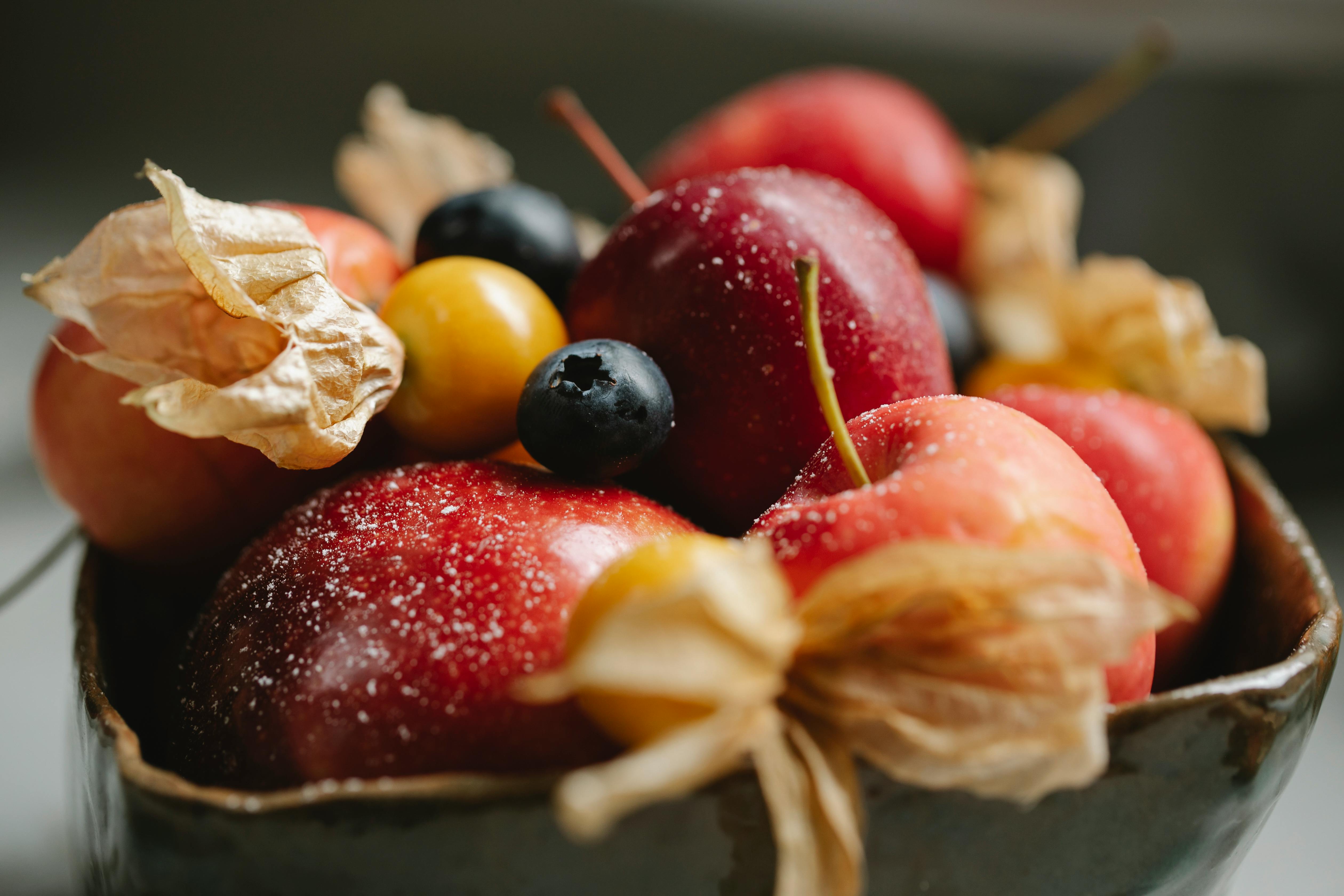Blueberries are a small but mighty fruit, with a wide range of health benefits. Inside each blueberry is a treasure trove of vitamins, minerals and antioxidants. From vitamin C to manganese, blueberries are packed with nutrients that can help support your overall health. In addition to the vitamins and minerals, blueberries contain phytochemicals, which are naturally occurring plant compounds that have a variety of health benefits.A blueberry is made up of a juicy, sweet-tart flesh surrounding a small seed. The skin of a blueberry can range in color from light to dark blue and is covered in a white, waxy coating. The fruit grows on shrubs and is related to bilberries, huckleberries, and cranberries.
Nutritional Content Of A Blueberry
Blueberries are a nutrient-dense fruit and are packed with essential vitamins and minerals. They are an excellent source of dietary fiber, vitamin C, vitamin K, and manganese. Blueberries also contain a wide range of antioxidants, including flavonoids like anthocyanins and proanthocyanidins. The health benefits of blueberries include improved digestion, cardiovascular health, brain health, and improved blood sugar levels.
One cup of raw blueberries contains 84 calories and 3.6 grams of dietary fiber. It is also a good source of vitamin C (14% of the RDI), vitamin K (25% of the RDI), manganese (25% of the RDI) and other B vitamins such as niacin, B6 and folate.
In addition to vitamins and minerals, blueberries contain phytochemicals such as flavonoids and polyphenols that have antioxidant properties. These compounds help reduce inflammation in the body as well as protect against oxidative damage from free radicals. Blueberries may also help reduce cholesterol levels in the body by increasing HDL (good) cholesterol levels while decreasing LDL (bad) cholesterol levels.
Blueberries are low in calories but high in nutrients which makes them an excellent addition to any healthy diet. They can be eaten raw or added to smoothies, yogurt, oatmeal or baked goods for added nutrition.
Health Benefits Of Eating Blueberries
Blueberries are one of the most nutritious and delicious fruits available. They are packed with essential vitamins, minerals, and antioxidants that can help you stay healthy and fit. Blueberries are also low in calories, fat, and sodium, making them a great addition to any healthy diet. Here are some of the health benefits of eating blueberries:
1. Improved Heart Health: Studies have shown that blueberries can help reduce cholesterol levels and improve overall heart health. The antioxidants found in blueberries can help protect against atherosclerosis, which is a hardening of the arteries caused by plaque buildup.
2. Reduced Risk of Cancer: Studies have also shown that blueberries may reduce the risk of certain types of cancer. The antioxidants found in blueberries have been found to be effective at fighting off free radicals, which can cause cell damage and lead to cancer development.
3. Improved Digestive Health: Blueberries contain high amounts of dietary fiber, which helps keep the digestive tract functioning properly and prevents constipation. The fiber also helps to keep your blood sugar levels stable so you don’t experience swings in energy levels throughout the day.
4. Better Brain Function: Blueberries have been studied for their effects on cognitive function in older adults. They have been found to improve memory, focus, and coordination when consumed regularly over time.
5. Increased Immunity: Blueberry consumption has been linked to an increased immune response due to their high antioxidant content. Antioxidants help reduce inflammation in the body which boosts your immune system’s ability to fight off disease-causing bacteria and viruses more effectively.
Eating blueberries is a great way to boost your health and well-being without adding a lot of calories or sugar into your diet. Adding just a handful of fresh or frozen blueberries into your daily routine can make all the difference when it comes to improving your overall health!
Different Types Of Blueberries
Blueberries are one of the most popular fruits today. They are packed with antioxidants, vitamins, minerals, and fiber, and can be enjoyed in a variety of dishes. But did you know that there are actually several different types of blueberries? In this article, we’ll discuss the various types of blueberries available and how they differ from one another.
The most common type of blueberry is the highbush variety. These are the large, plump berries found in grocery stores and used in recipes for pies, muffins, jams, and other treats. Highbush blueberries have a sweet flavor and tend to be larger than other varieties.
The next type is the lowbush or “wild” blueberry. These small berries grow in abundance throughout North America and have a more tart flavor than their highbush counterparts. They’re often used to make jams and jellies or as an addition to breakfast cereals and oatmeal.
Finally, there are half-high or “rabbit eye” blueberries. These berries have a similar shape to highbush varieties but are smaller in size with a sweeter taste than either lowbush or highbush varieties. They’re often used in baking recipes such as muffins or pancakes because they hold their shape well when cooked.
Each type of blueberry has its own unique flavor profile and nutritional benefits that make them great additions to any diet. Whether you prefer sweet or tart flavors, there’s sure to be a variety that suits your taste buds!
How To Select The Best Blueberries
Selecting the best blueberries is not as difficult as it may seem. Here are some tips on how to pick the freshest and sweetest blueberries for your recipes.
The first thing to consider when selecting blueberries is their appearance. Look for plump, firm berries that are uniformly colored and free of bruises or blemishes. If you are buying organic, make sure that the berries have a vibrant color and no mold or fungus on them.
Next, you should smell the berries to make sure that they are fresh. The sweet scent of ripe blueberries is unmistakable and you should be able to tell if they are fresh or not by their aroma. If there is no smell, then they may not be as fresh as you would like them to be.
Finally, give the berries a gentle squeeze before purchasing them. You want them to be slightly firm but still give under slight pressure when squeezed gently between your fingers. If they are too hard or too soft, they may not be at their peak of ripeness and flavor.
By following these simple tips, you can easily select the best blueberries for your recipes. Enjoy!

Storing Blueberries
Blueberries are a delicious and versatile fruit that can be used in a variety of recipes. They are also highly perishable, so it is important to properly store them in order to maximize their shelf life. When stored correctly, fresh blueberries can last up to two weeks in the refrigerator. Here are some tips for storing blueberries:
The first step is to inspect the blueberries for any signs of mold or spoilage. Discard any soft or mushy berries right away, as these will not last long. Once you have checked for spoilage, rinse the blueberries with cold water and dry them thoroughly with paper towels.
Once the berries are dry, place them in an airtight container or resealable plastic bag. Make sure the container or bag is not too full; leaving some space between the berries will help ensure that they do not become squashed or crushed during storage. To further extend their shelf life, place a paper towel at the bottom of the container before adding the blueberries.
Finally, store your blueberries in the refrigerator as soon as possible after purchase. This will help preserve their flavor and texture for longer periods of time. If you plan on keeping them longer than two weeks, consider freezing them for future use. To freeze fresh blueberries, spread them on a cookie sheet and place it in the freezer until they are completely frozen, then transfer them into an airtight container or resealable bag before returning to the freezer.
By following these simple steps, you can keep your fresh blueberries tasting great for up to two weeks!
How To Use Fresh Blueberries
Fresh blueberries are a delicious and versatile ingredient. Whether you’re baking a pie, making a smoothie, or topping off some yogurt, there’s no wrong way to use fresh blueberries. Here are just a few ways to make the most of this delicious fruit.
For an easy snack, simply rinse the fresh blueberries and enjoy them on their own. Alternatively, you can mix them into a bowl of oatmeal or yogurt for a bit of sweetness and flavor. You can also add them to salads for some extra crunch and color.
Baking with fresh blueberries is also very simple. Try adding them to muffins, cakes, pies, tarts, and more! For best results, sprinkle some flour onto the berries before adding them to your batter; this will help prevent them from sinking to the bottom while baking.
If you want to make something cold and refreshing try blending up some fresh blueberries with ice cream for an easy milkshake or smoothie. If you’re feeling more adventurous you can also use the berries in homemade jams or jellies.
Fresh blueberries can also be used in savory dishes as well. Add them to your favorite stir-fries or curries for extra sweetness and flavor. Or try adding them on top of grilled meats like salmon or chicken for a burst of fruity flavor.
No matter how you choose to use fresh blueberries they are sure to add a burst of flavor and color to any dish!
Fresh Blueberry Recipes
Nothing says summer quite like fresh blueberries! Whether you’ve picked them yourself or just grabbed a pint from the store, blueberries make a great addition to any recipe. From breakfast to dinner, snacks to desserts, there are so many delicious ways to use fresh blueberries. Here are some of our favorites:
For a simple breakfast treat, try Blueberry Pancakes. Just whisk together your favorite pancake batter, fold in some fresh blueberries and cook on a griddle. Top with more berries and butter for an extra special start to the day. Or mix up some Blueberry Muffins with sugar and cinnamon topping for a tasty snack any time of day.
Salads are another great way to enjoy fresh blueberries. Try making a Blueberry Spinach Salad with feta cheese, almonds, red onion and a light honey vinaigrette for an easy lunch or dinner side dish. Or toss together a Strawberry Blueberry Salad with mixed greens, walnuts and balsamic dressing for an elegant summer salad that’s sure to impress.
For dinner, why not try Grilled Salmon with Blueberry Salsa? It’s an easy one-dish meal that’s full of flavor. And don’t forget about dessert! You can’t go wrong with classic Blueberry Pie or even some homemade Blueberry Ice Cream – perfect for those hot summer days!
Whatever you make with your fresh blueberries, you’re sure to be delighted by the sweet and juicy flavor they bring to each dish!

Conclusion
Blueberries are not only delicious and versatile but also full of essential nutrients and antioxidants that can help protect your body from disease. They are low in calories and high in fiber, which can make them a great addition to any healthy diet. Plus, their sweet-tart flavor adds a great burst of flavor to any dish. So, the next time you reach for blueberries, you can be sure that you’re getting all of the health benefits as well as a tasty snack.
Blueberries are truly a superfood and one of nature’s most nutritious gifts. With their amazing flavor and endless nutrition, it’s easy to see why these little berries are so beloved by so many people around the world.



